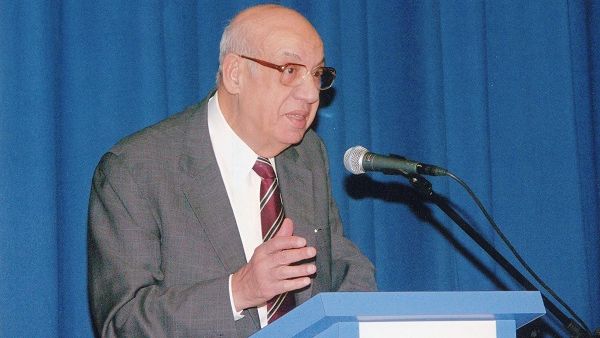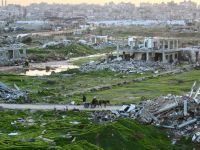AUB Mourns the Loss of Abdul Mohsen Al-Qattan

Chairman of the Board of Trustees of the American University of Beirut (AUB) Dr. Philip S. Khoury and its President Dr. Fadlo R. Khuri join the rest of the AUB community in mourning the loss of esteemed philanthropist and AUB trustee emeritus, Abdul Mohsen Al-Qattan, who passed away on December 4, 2017 in London.
Born in Jaffa, Palestine in 1928, Al-Qattan and his family were forced to flee during the 1948 Palestinian exodus (Nakba). Although nearly destitute after leaving Palestine, Al-Qattan went on to become an internationally successful businessman and ardent philanthropist. Throughout his life, he remained devoted to his homeland and committed to promoting education in the Arab world.
At AUB, Al-Qattan initially studied political science and economics, but then switched to business and earned his Bachelor of Business Administration in 1951. Later in life, he was a member of the AUB Board of Trustees from 1995 to 2003 and was subsequently appointed trustee emeritus. His eldest daughter, Najwa, also attended AUB and graduated with a BA in Philosophy in 1977.
After graduating from AUB, Al-Qattan worked as a teacher in Jordan and then moved to Kuwait where he was controller general of the Ministry of Water and Electricity. In 1963, he founded Al Hani Construction and Trading Company, which grew to become one of Kuwait’s largest construction firms. He went on to found and manage several successful companies operating in the Middle East and Europe.
Al-Qattan was deeply committed to education and supporting the Palestinian people and culture. In 1993, he founded the A. M. Qattan Foundation (London, Ramallah, and Gaza) to provide funding for educational and cultural projects in the Arab world, particularly Palestine. Today, the foundation is one of the leading charitable institutions in the Arab world and focuses its development efforts on children, teachers, and young artists.
A great believer in the power of education to transform and uplift, Al-Qattan supported Birzeit University by donating to its library and contributing to upgrading its facilities. He also gave generously to his alma mater, establishing an endowed scholarship at AUB and supporting the rebuilding of College Hall, among other contributions. Chairman Khoury commented on the legacy left behind by Abdul Mohsen Al-Qattan at AUB and beyond:
“As well as his service to his homeland, Abu Hani was one of the longest-standing trustees and trustee emeriti of the American University of Beirut and he will be deeply missed by the AUB family,” said Khoury, who praised Al-Qattan’s “extraordinary commitment and generosity” towards the people of Palestine, the wider Arab world, and AUB.
President Fadlo Khuri also spoke glowingly of Al-Qattan, saying, “his reputation went before him as a tireless servant of the Arab peoples, especially his own brethren in occupied Palestine and the Palestinian diaspora, into which he was forced in the midst of his studies at AUB.” President Khuri added that, “Abdul Mohsen offered great service and friendship to his alma mater, offering AUB sterling support for its academic mission among his many other philanthropic commitments.”
In addition to supporting education, Abdul Mohsen Al-Qattan was extremely active in many organizations, including the Institute for Palestine Studies (Lebanon), the Arab Fund for Economic and Social Development (Kuwait), the Arab Thought Forum (Jordan), and the Center for Arab Unity Studies (Lebanon). He also co-founded the Welfare Association of Geneva. He is survived by his four children: Najwa, Hani, Leenah, and Omar.
Background Information
American University of Beirut
Founded in 1866, the American University of Beirut is a teaching-centered research university based on the American liberal arts model of higher education. AUB has over 9,000 students and over 1,200 instructional faculty members. The University encourages freedom of thought and expression and seeks to graduate men and women committed to creative and critical thinking, lifelong learning, personal integrity, civic responsibility, and leadership.






